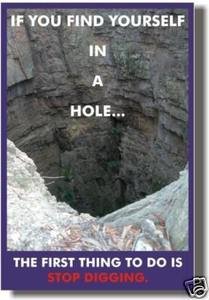I know I'm gonna regret sticking my nose between you two, but here goes.
Marko said
People who can do the above can distinguish between "need" & "want". And it is MUCH easier to do in "fly over country".
Not My Fault said
My father was an engineer that certainly made middle income. Our house was on 1/4 acre/3 bedroom/NO a/c/1500 sq feet 1 & 1/2 bath for Mom/Dad/3 kiddies/1 car. I think many will in the near future the current standard of housing [houses 2500 sq ft & up]unsustainable as energy prices rise.
The current middle class certainly has more stuff & gadgets. And many kids starting want to have the same living style as their parents[who likely spent 20-30 yrs rising to that living style.
But material stuff is lots cheaper now that it was 50 years ago. For example a tube color[and really not very good color] TV with 25" screen would run $500[$3600+ in todays dollars]. Quite a chunk out of a $12,000 salary. One can get a plasma 42" for $525 or LCD 42" for $400. The same is true for all appliances & phone service & vehicles & sporting equipment.
Nope, a kid starting out on a $40k can have just a good life as a kid starting out in 1965 with a $5k income. They just needed to have learned about "wants" vs "needs".
I didn't learn that lesson til I was 30. While I was making VERY GOOD income working in a job I hated*. I was living in an apartment overlooking the pacific ocean, driving a bimmer, fancy clothes, out clubbing & dining ALL the time. In effect spending twice my income, because all that stuff/crap was going to make me happy. It doesn't & didn't.
So I started over moving to fly over country & started my own business/built my own house FIREd [though I barely qualify as I was 60 when I retired].
* mebbe it was just my job. But my experience that most mid level corporate jobs have lots of responsibilities but never enough authority/power to fulfill the job's responsibility. A situation like mine build lots of stress.
Marko said
I always marvel at folks on this forum who can live on $50K-$75K quite nicely, flyover country or not.
People who can do the above can distinguish between "need" & "want". And it is MUCH easier to do in "fly over country".
Not My Fault said
Even going back to the seventies things were much different. My dad has a decent job but my mom still made some of our clothes. We only got one pair of school shoes and the old school shoes became play shoes. My point is that people could afford to raise a family on a factory or production job if they we were willing to accept the milkman's standard is living. I am not saying that that standard is bad it is just unrecognizable today. Imagine telling a 26 year old today to get rid of their smartphone, a couple of TV sets, their computer and anything else that wasn't commonly available to the milkman.
My father was an engineer that certainly made middle income. Our house was on 1/4 acre/3 bedroom/NO a/c/1500 sq feet 1 & 1/2 bath for Mom/Dad/3 kiddies/1 car. I think many will in the near future the current standard of housing [houses 2500 sq ft & up]unsustainable as energy prices rise.
The current middle class certainly has more stuff & gadgets. And many kids starting want to have the same living style as their parents[who likely spent 20-30 yrs rising to that living style.
But material stuff is lots cheaper now that it was 50 years ago. For example a tube color[and really not very good color] TV with 25" screen would run $500[$3600+ in todays dollars]. Quite a chunk out of a $12,000 salary. One can get a plasma 42" for $525 or LCD 42" for $400. The same is true for all appliances & phone service & vehicles & sporting equipment.
Nope, a kid starting out on a $40k can have just a good life as a kid starting out in 1965 with a $5k income. They just needed to have learned about "wants" vs "needs".
I didn't learn that lesson til I was 30. While I was making VERY GOOD income working in a job I hated*. I was living in an apartment overlooking the pacific ocean, driving a bimmer, fancy clothes, out clubbing & dining ALL the time. In effect spending twice my income, because all that stuff/crap was going to make me happy. It doesn't & didn't.
So I started over moving to fly over country & started my own business/built my own house FIREd [though I barely qualify as I was 60 when I retired].
* mebbe it was just my job. But my experience that most mid level corporate jobs have lots of responsibilities but never enough authority/power to fulfill the job's responsibility. A situation like mine build lots of stress.


